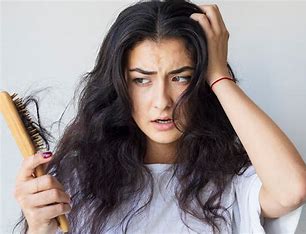Hair fall is a common concern affecting people of all ages. While it is natural to lose about 50-100 strands daily, excessive hair loss may signal underlying health issues or lifestyle factors. Causes range from nutrient deficiencies and stress to hormonal imbalances and genetics. Ayurveda offers a holistic approach to addressing hair fall by focusing on internal health, herbal remedies, and nutrition.
Common Causes of Hair Fall
- Nutritional Deficiencies:
- Iron: Low iron levels can weaken hair follicles, leading to hair thinning.
- Zinc: Important for tissue repair and hair follicle function.
- Vitamin D: Essential for new follicle stimulation.
- Biotin (Vitamin B7): Supports keratin production and strengthens hair.
- Protein: As hair is made of keratin (a protein), a deficiency can slow hair growth.
- Lifestyle Factors:
- Stress triggers hair fall by shifting hair follicles to the resting phase (telogen effluvium).
- Overuse of chemical treatments and heat styling damages hair shafts.
- Medical Conditions:
- Thyroid disorders, polycystic ovary syndrome (PCOS), and autoimmune conditions like alopecia areata can lead to hair loss.
Ayurvedic Perspective on Hair Fall
Ayurveda links hair health to dosha imbalances, particularly an aggravated Pitta dosha, which heats the scalp and weakens follicles. Poor digestion (Agni) and accumulation of toxins (Ama) further disrupt hair growth.
Ayurvedic Management
- Herbal Remedies for Hair Health:
- Bhringraj (Eclipta prostrata): Known as the “King of Hair,” it promotes growth and reduces hair loss.
- Amla (Indian Gooseberry): Rich in Vitamin C and antioxidants, it nourishes the scalp and strengthens hair roots.
- Neem: Its antibacterial properties combat dandruff and scalp infections.
- Fenugreek Seeds (Methi): Strengthens hair shafts and adds shine.
- Aloe Vera: Soothes the scalp and promotes hair regeneration.
- Hair Oils:
- Brahmi and Coconut Oil: Cooling and nourishing, these oils balance Pitta dosha.
- Castor Oil: Thickens hair and reduces breakage.
- DIY Herbal Packs:
- Amla, Reetha, and Shikakai: Acts as a natural cleanser while strengthening roots.
- Henna and Hibiscus Paste: Conditions and restores the natural shine of hair.
Nutritional Approach to Combat Hair Fall
A nutrient-rich diet is essential for maintaining healthy hair.
- Iron-Rich Foods:
- Spinach, lentils, tofu, and fortified cereals boost hemoglobin levels and oxygen delivery to hair follicles.
- Protein Sources:
- Legumes, quinoa, nuts, and seeds provide keratin for hair strength.
- Vitamin C for Absorption:
- Citrus fruits, bell peppers, and strawberries enhance iron absorption and stimulate collagen production for scalp health.
- Healthy Fats:
- Avocados, flaxseeds, and walnuts supply omega-3 fatty acids for scalp nourishment.
- Biotin Boosters:
- Almonds, sweet potatoes, and eggs support keratin structure.
Ayurvedic Daily Hair Care Routine
- Oil Massage (Abhyanga):
- Massage the scalp twice a week with warm herbal oil to improve circulation and strengthen roots.
- Gentle Cleansing:
- Use natural shampoos free of sulfates and parabens.
- Avoid Over-Washing:
- Shampoo 2-3 times weekly to retain natural oils.
- Protective Measures:
- Use scarves or hats to shield hair from UV rays and pollution.
- Stress Management:
- Incorporate yoga, meditation, and Pranayama (breathing exercises) to reduce stress-induced hair fall.
Ayurveda combines internal healing with external care. By addressing root causes like dosha imbalances and nutrient deficiencies, it offers long-term solutions. Incorporating herbal treatments, mindful eating, and a disciplined lifestyle ensures stronger, healthier hair.
This integrated approach transforms hair care into self-care, enhancing overall well-being while tackling hair fall.


